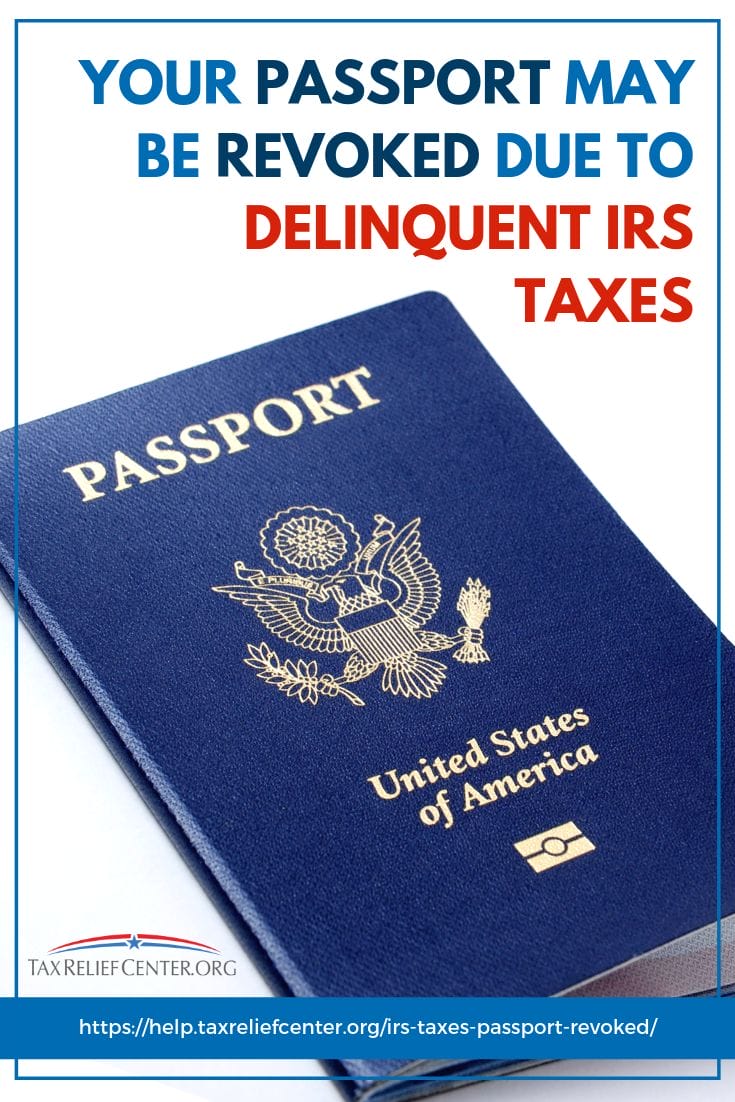Unpaid IRS taxes can lead not just to penalties but also the revocation of a passport, and not a lot of taxpayers know how to proceed with the revocation process.
RELATED: A Step-By-Step Guide To Settling IRS Tax Debt
In this article:
- How Do Delinquent Taxes Affect Taxpayers?
- Why Does the IRS Revoke Passports for Back Taxes?
- Who Is a Seriously Delinquent Taxpayer?
- What Is the IRS Passport Revocation Procedure?
- How Can a Taxpayer Resolve an IRS Passport Case?
- If Paying in Full Is Not Viable, Can the Taxpayer Pay in Installments?
- Can Taxpayers Also Request for an Offer in Compromise?
Questions Taxpayers Have About Their Passports and Their IRS Taxes
How Do Delinquent Taxes Affect Taxpayers?
The IRS doesn’t just give penalties and fees to taxpayers who file or pay their taxes late. When taxes remain unpaid for long periods of time, the IRS also resorts to methods like wage garnishment, tax levies, and even the revocation or denial of a passport.
Lower credit scores after a tax lien or levy, a bank levy, and, in some cases, fines of up to $10,000 or imprisonment for malicious filing are all possible results of delinquent taxes.
These penalties apply to both unpaid and unfiled taxes. The IRS recommends that people file even if they do not have the money to pay in full just to prevent higher fees.
Why Does the IRS Revoke Passports for Back Taxes?
The law empowers the IRS to revoke, deny, or limit a passport of a seriously delinquent taxpayer. A 2015 law, Fixing America’s Surface Transportation Act (FAST Act) made the law clearer, which led to the IRS applying Notice 2018-01 detailing the procedure.
The main reason why passport revocation exists lies with the collection of taxes.
The IRS needs assurance that a taxpayer is not a “flight-risk.” This can discourage taxpayers from not filing and paying taxes.
Of course, legal action is necessary to showcase civil and criminal liabilities. It does not necessarily have to be a court proceeding but may be an investigation.
It is not the IRS that revokes the passport, as they do not have the legal power to do that. They still need to submit the name to the local state to prevent flight-risk people from taking off.
Flight-Risk Definition: A person is a flight-risk when he or she has 1) civil and criminal liabilities and 2) has the ability to move away from the jurisdiction where he or she has to serve the liabilities.
RELATED: IRS Debt Forgiveness Program: Are You Eligible?
Who Is a Seriously Delinquent Taxpayer?
Denying and revoking a passport is a serious matter, so the law added a few safeguards and limitations for taxpayers.
The following are reasons for the IRS to pursue certain delinquent taxpayers:
- They were already assessed by the IRS;
- Their unpaid taxes are greater than $51,000;
- There is a federal tax lien;
- The taxpayer has exhausted legal remedies like a right to a hearing; and
- A tax levy is already in place.
The law states the unpaid tax limit grows with inflation each year and rounded off to the nearest thousand. As of 2018, the limit is at $51,000.
What Is the IRS Passport Revocation Procedure?

The whole passport revocation process starts with:
- The taxpayer not filing or paying the taxes on time.
- The IRS sends a Notice and Demand for Payment (usually a CP501) to inform the delinquent taxpayer of the amount due. The taxpayer can pay the amount or respond with a counter-offer.
The IRS usually sends the CP501 with a higher amount as the IRS may not include deductions the taxpayer qualifies for. - If the taxpayer does not respond to the IRS, the taxpayer may receive the Final Notice of Intent to Levy (Form CP504) to start the tax levy proceedings. The IRS cannot proceed to passport revocation if there is no tax levy in place.
- The IRS also sends a Notice of Your Right to a Hearing (Collection Due Process) to signal the start of proceedings in the tax court. The taxpayer will need to accomplish Form 12153 within 30 days from receipt of the notice or else the tax levy becomes applicable without the need of a hearing.
- If the tax assessment reaches $50,000, together with the fees and penalties, then the IRS can request the State Department to revoke or deny the passport of the taxpayer. However, the State usually gives the taxpayer around 90 days to resolve the issue, including the 30-day timeframe for answering Form 12153.
- Once the taxpayer has resolved the issue, the State will receive a Notification of Reversal, wherein the IRS certifies the resolution of the issue, within 30 days. The State can then lift the denial or revocation of the passport.
The total time spent in the IRS passport revocation and denial process is more or less 4 months. Due to this timeframe, taxpayers should try to resolve the issue as soon as possible.
How Can a Taxpayer Resolve an IRS Passport Case?
The State can only allow the lifting of the revocation upon receipt of the Notification of Reversal from the IRS. In order for the IRS to send out the notification, the taxpayer must pay the taxes, plus penalties, in full.
If Paying in Full Is Not Viable, Can the Taxpayer Pay in Installments?
Yes, the taxpayer can ask for a payment plan. Finding $51,000 is immensely difficult for the average person.
However, the IRS must agree with the terms, and negotiations should commence within the 30-day timeframe from receipt of the CDP (Step 5) since tax court proceedings may complicate negotiations.
Generally, the installment plan for taxpayers, in this case, falls under the “Non-Streamlined” Installment Agreement. While most installment plans have a schedule for 5 years, the IRS may provide a longer period.
Unlike most installment plans that have a standard schedule and calculation, the non-streamlined installment agreement needs negotiations for both parties. The IRS considers not only the tax amount but also the financial capability, risks, and total net worth of an individual.
Can Taxpayers Also Request for an Offer in Compromise?
Yes, taxpayers can negotiate for a lower tax amount. In fact, an offer in compromise proceeding can postpone the implementation of the passport revocation if the OIC proceedings start before the receipt of CP504 (step 3).
Usually, the OIC requires the taxpayer to perform one of two actions.
The first option requires the taxpayer to deposit 20% of the unpaid tax amount. This deposit provides the taxpayer the option to proceed with an installment plan if the IRS rejects the offer.
The second option has the taxpayer already in an installment plan before applying for an OIC. This method provides the IRS time to deliberate the offer which may put penalties on hold momentarily.
Unpaid IRS taxes can be a hurdle to any travel plans, so addressing debt should be a priority. Knowledge about the process, purposes, and remedies of passport revocation can help motivate individuals to become responsible taxpayers.
Do you have other questions about passport revocation due to unpaid IRS taxes? Let us discuss in the comments section below.
If you owe back taxes, visit taxreliefcenter.org for more information on tax relief options.
Up Next:
- What To Do When You Can’t Make This Month’s IRS Installment Payment
- Should You Consider Filing For Bankruptcy?
- 12 Reasons To Speak To A Tax Relief Specialist About Your Back Taxes ASAP


